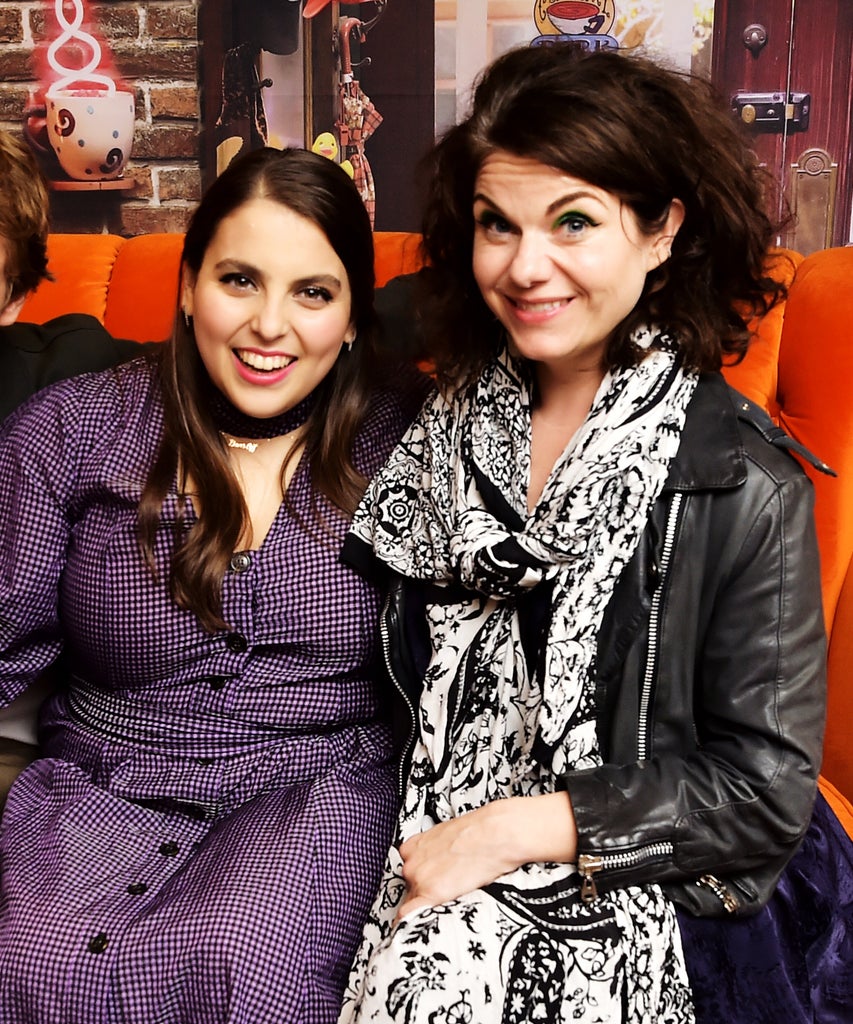
It was only after we got Beanie Feldstein that we realized how fucked we would have been if we didn’t have Beanie Feldstein.
If you’ve written the kind of movie that needs Beanie Feldstein to play the lead, then man, you really need Beanie Feldstein to play the lead. Who else could play a fat, clever, funny, working-class girl who becomes a music journalist at 16 (!!), runs around 1990s London setting it on fire, and then realizes — while at a hot-tub party — that everyone in the music industry is a shallow, vexatious penis, and so flamboyantly cusses everyone out, while wearing a bikini made out of a trash bag? And while still being impossibly charismatic and loveable? There just isn’t anyone else. It’s both impossibly niche and a bit of a stretch.
I mean, Meryl Streep’s versatile, and God knows game to have a go — but even she can’t play someone still not yet old enough to become a blood donor. Oh man, thank God we got Beanie. Without her, we’d have had to CGI Judi Dench so we used just her eyes, Polar Express-style; or maybe use a puppet. There just isn’t anyone else who could have done it.
When I was writing How To Build A Girl — amusing myself while chain-smoking, and recalling my own teenage years as a rock critic — it just didn’t occur to me that the biggest problem would be casting. I simply wrote a central character that was like me at the time: Optimistic, obsessed with 19th century literature, horny, rocking a size 16 bum and a size 20 mouth, without once thinking, Hang on — what young actress could actually play this?
We all, obviously, think we’re quite normal. It never occurred to me that, actually, I was, as a teenager, a complete freak.
Thankfully, the process of making a film takes so long — we had the first meeting in, I think 1842 — that Beanie Feldstein had time to be conceived, born, have a successful Broadway career, be the breakout role in Lady Bird, star in Booksmart, become the kind of movie star that girls hysterically hug and cry when they meet her, and then wind up in London in 2018, accepting our film.
After the dinner, our producer admitted, as we stood in the rain, having a smoke, that if Beanie didn’t exist, making the film would have been impossible, “Unless we’d found a way to strap tits and a wig on Timothée Chalamet. And, let’s face it — that would have been very problematic.”
So, every time I went on set, I marveled anew at what my biggest privilege as a screenwriter has been: Getting to watch someone so charismatic you’ve become a little bit obsessed with them, doing all the things you wished you’d seen someone do in a movie when you were a teenager. And then having a scene where Emma Thompson turns up and plays, essentially, God.
It was only after we got Beanie Feldstein that we realized how fucked we would have been if we didn’t have Beanie Feldstein.
The plot is simple: Johanna Morrigan is 16, clever, poor, from a big, chaotic, amusing family — her parents are played by Paddy Considine and Sarah Solemani; she’s a very lucky girl — and her tiny town is killing her. Boys chase her, shouting “Lesbian!”, because she reads The Female Eunuch. Indeed, they end up throwing the hardback at her head. “But, luckily,” she muses, “I know what an impact a great book can have.”
As this is literally an incident from my life, going back to the place where it happened — The Green, in Wolverhampton; a uniquely depressing piece of wasteland — and watching a whole film crew shoot Beanie running for her life from her assailants. It felt, and I cannot lie, like sweet, sweet revenge. At the end of the day, “revenge” tends to be the motivation for a lot of artists. If, by the age of 16, you have a list entitled “The Motherfuckers,” in a book titled “The Feud Jotter,” there is every chance you, too, might end up writing a book, film, or concept album about someone who was unfairly victimized for reading out loud a poem about how your best friend was their dog, because “She hugs me with her eyes.” (That’s just one example.)
I got Beanie to do that, too.
Oh, we got Beanie to do all the fabulous things. When she gets her big break, in London, as a writer, we give her the best makeover of all time — from bobbly sweaters and ill-fitting jeans, into a frock-coat, top hat, short-shorts, and Doc Martins.
“Good God — you look like the Child Catcher,” her brother, Krissi — played by Laurie Kynaston so brilliantly, we expanded his role from the book — snarks. But she doesn’t. She looks like a freaking indie-rock goddess.
We get her to “discover her sexuality” in a montage wherein she learns all about “freaky foot guys,” and how to deal with an abnormally large penis: “The secret is, put your hands on his chest and BRACE BRACE BRACE BRACE!”
We see her strutting around London like a queen in a ballgown; we see her falling in love with the bear-like rock-star played by Alfie Allen in his first romantic comedy role., (I have to say, he’s charming the tits off everyone who’s seen him.) When he sings — a song specially composed for the movie by Guy Garvey from Elbow, entitled Day Making Girl — it’s really him singing. Turns out, Lily Allen isn’t the only pop-star in the Allen family.
And when he sings it to Beanie, you think, Oh, man — she really is a day-making girl. A whole generation of teenage girls are going to see a girl like this, in a film like this, and finally feel they have found themselves.
Those girls won’t feel like freaks, as I did when I was their age. They’ll have a story about how girls with nothing save for optimism, hard work, and a fistfull of jokes can get anywhere. They’ll have 90 minutes of Beanie Feldstein doing what literally no-one else right now can do: Making being a big, young, joyous girl look like the best fun in the world. I’ve tried to write the film I needed when I was 16.
How to Build a Girl premiered to enthusiastic reviews at the 2019 Toronto International Film Festival. It opens in select theaters later this year.
How To Build A Girl TIFF Review
It's The Year Of The Woman At TIFF
The 29 Most Exciting Movies By Women At Tiff 2019
from refinery29
Caitlin Moran Didn’t Know How To Build A Girl — Until She Met Beanie Feldstein
![Caitlin Moran Didn’t Know How To Build A Girl — Until She Met Beanie Feldstein]() Reviewed by streakoggi
on
May 08, 2020
Rating:
Reviewed by streakoggi
on
May 08, 2020
Rating:




